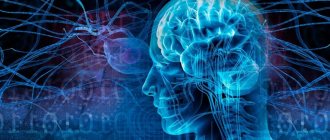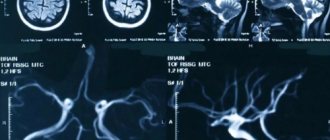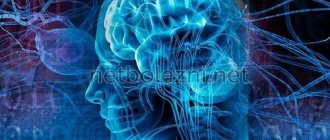Senile degeneration of the brain is also known as senile insanity or dementia. The first prerequisites for the development of brain dystrophy can occur in a person after 60 years of age, although the weakening of memory over time is not a normal phenomenon.
The concept of degeneration means the weakening or loss of special functions of an organ. Dementia (dementia) is a chronic mental disorder in which behavioral disorders and loss of basic self-care skills are possible.
Thus, there is a violation of higher cortical functions. Senile (senile) brain degeneration is most often diagnosed in people over 65 years of age.
Dementia - senile dementia
Age-related disorders of brain activity, called dementia - acquired (or senile) dementia, are caused by the death of nerve cells in the brain and manifest themselves in a decrease in mental activity, impaired memory, speech, consciousness and behavior of the sick person.
The problem is based on degenerative changes (atrophy) of brain cells and vascular disorders, leading to a lack of blood circulation and oxygen supply to the brain tissue.
According to statistics, the first, subtle symptoms in the form of partial, temporary loss of memory, time orientation and loss of some habitual skills can appear after 50 years. By the age of 60, about 3% of older people have been diagnosed with dementia. By the age of 80, 25% of the inhabitants of our planet suffer from various types of dementia.
There are different types of dementia
Dementia, depending on the causes and location of the affected areas of the brain, is divided into several types:
- Damage to the cerebral cortex - cortical dementia. A type of such dementia is Alzheimer's disease;
- Damage to white matter and subcortical structures of the brain - subcortical dementia. This type of dementia includes progressive supranuclear palsy and Parkinson's disease;
- Degenerative changes in the cortex and subcortical structures of the brain - cortical-subcortical dementia is often a consequence of diseases of the vascular system: atherosclerosis or hypertension;
- Multiple small lesions in different areas of the brain - Multifocal dementia This type of disorder is represented by Creutzfeldt-Jakob disease.
Signs of dementia
The aging process is always accompanied by various changes in human behavior, but changes are different from changes. Indirect signs of senile dementia in a person may include the following behavioral deviations:
- Experiences temporary memory lapses;
- Forgets the location of ordinary things in the house, while accusing loved ones of theft;
- Experiences frequent sudden changes in mood;
- Often becomes depressed and loses interest in life;
- Loses simple household skills (tying shoelaces, boiling a kettle, turning on the TV...);
- Experiences problems with speech (slowness, distortion of speech);
- Ceases to understand interlocutors, repeatedly asks to repeat what was said;
- Loses orientation in time and space;
If you notice such symptoms in a loved one, you should contact specialized institutions. According to doctors, the progression of the disease can be slowed down with proper medical care.
Recommendations for senile brain degeneration
Consultation with a psychiatrist is recommended.
| • | Leading specialists and institutions for the treatment of this disease in Russia: |
| Doctor of Medical Sciences, Head of the Department of Russian State Medical University, Professor, Academician of the Russian Academy of Medical Sciences Gusev E.I. | |
| • | Leading specialists and institutions for the treatment of this disease in the world: |
| G. AVANZINI, Italy |
Diagnosis
An accurate diagnosis, determining the type of dementia and the degree of development of the probable causes of the disease, can only be made by a doctor (neurologist or psychiatrist). To do this, data is collected on the signs and course of the disease, the patient himself, close friends and relatives living with him are interviewed. Various medical examinations are carried out: cerebral vascular examination, blood tests, MRI... The patient is tested using neuropsychological screening scales.
Development of the disease
At an early stage ( mild dementia ), brain dysfunction is already noticeable. The person becomes irritable and forgetful, and experiences frequent headaches. At this stage, the elderly person is still able to think critically, take care of himself and live independently.
The second, moderate degree is characterized by significant disorders of mental activity and memory. The person loses basic everyday skills and requires constant supervision from relatives, friends or a caregiver.
When moving to a severe degree of disorder, a person ceases to recognize and understand those around him; there is no longer any talk about independent self-care, even in small things. In this condition, the patient needs constant care of qualified personnel.
Often, lack of attention from loved ones does not allow us to detect signs of dementia at an early stage and take timely measures to slow down the progression of senile dementia.
Symptoms of senile brain degeneration
For the diagnosis of dementia, the following symptoms are important: the presence of thinking disorders (decreased ability to abstract, logical thinking, impaired verbal functions); disorders of higher functions (agnosia, apraxia, aphasia, acalculia, agraphia, alexia); memory impairment; attention disorders (ability to respond to several stimuli simultaneously, switching attention); volitional disorders (lethargy, inactivity, lack of initiative or motor disinhibition, unproductive fussiness); disorder of desires and behavior; emotional disorders (affective instability, decreased mood or its unmotivated increase, tendency to a melancholy-angry mood, irritability, “erasing” or grotesque sharpening of personal characteristics); decreased critical attitude towards one’s condition.
The development of the disease goes through a number of stages. The first, so-called pre-dementia, affects fresh layers of memory and the ability to record new information. A person remembers worse, becomes distracted and apathetic, and his ability for abstract thinking decreases.
In the second stage (stage) - early dementia - memory impairment continues to progress. Symptoms of apraxia appear, i.e. movement disorders, and aphasia, i.e. disorders of coherent speech. However, the patient still remembers the basic facts of his life and retains the remnants of common sense.
At the third stage - moderate dementia - a person confuses words, ceases to recognize well-known people, his reading and writing skills decrease, and body coordination is impaired. Elements of delusion and false self-identification arise. Old people can leave home and “get lost”, do not follow the rules of hygiene and cannot perform natural necessities without outside care.
Then comes the stage of severe dementia, when speech is almost completely lost. Characterized by total apathy and exhaustion. The ability to act independently, even the most basic ones, is gradually lost. The patient no longer gets out of bed. Death often occurs not because of the disease itself, but because of associated causes - caused by immobility of pneumonia or bedsores.
On average, seven years pass from the onset of the disease to the death of the patient.
Dementia is divided into partial and total. Partial (dysmnestic, atherosclerotic) is characterized by uneven mental disorders - memory impairment predominates with preservation of the “core of personality” and criticism of one’s position. Total (diffuse, global) corresponds in its manifestations to a severe degree of dementia.
Causes of dementia
What are the causes of the death of nerve cells in the brain and the development of acquired dementia? Doctors agree that brain disorders can be caused by many different diseases and negative factors that can destroy brain vessels:
- Diseases of the vascular system Disturbances in the functioning of blood vessels lead to a lack of blood and oxygen supply to brain tissue with all the ensuing consequences;
- Infectious diseases Damage to brain tissue by various viruses, bacteria or toxins due to encephalitis, meningitis, AIDS and other viral diseases often leads to disruption of brain activity;
- Oncological diseases Various tumors, hemorrhages and inflammatory processes affecting the cerebral cortex often cause various disorders with signs of dementia...
- Traumatic brain injuries Physical destruction of brain tissue naturally leads to the death of nerve cells.
- Alcohol and drug abuse Long-term destructive effects of various toxins on nerve cells cannot but affect brain activity.
- Metabolic disorders A whole bunch of hormonal diseases, kidney and liver diseases lead to the accumulation of harmful substances in the blood that adversely affect brain activity.
There is no point in listing all the “risk factors” that, according to modern medicine, can lead a person to dementia. In such a situation, it would seem like a miracle for any person to live to be 80 years old and retain his sanity.
On the other hand, it is never possible to say exactly what exactly was the impetus for the development of senile dementia. If this misfortune happens to a loved one, be patient and contact a specialist...
Symptoms
The disease goes through three stages:
- Stage of asthenia. At this stage, the diagnosis of dystrophy or dyscirculatory encephalopathy is rarely made. Asthenic syndrome is characteristic of many diseases in the clinic of which intoxication syndrome is present. In addition, most mental disorders also begin with asthenic syndrome, and doctors often think in this direction. Asthenia syndrome is manifested by chronic fatigue, lethargy, reluctance to work, drowsiness, irritability, sleep disturbance, dizziness and headaches. There are no specific symptoms.
- Second stage. Characterized by progression of previous symptoms. Mental activity deteriorates: the speed of thinking decreases, the amount of memory and accuracy of information reproduction decreases, and the concentration of attention decreases. Speech becomes disordered: it becomes illegible. The patient mumbles and speaks quietly. Those around him have a hard time hearing him. Coordination is partially impaired: complex manipulations lose precision.
- Outcome of the disease. Discirculatory-dystrophic changes in the brain increase. The clinical picture of the disease includes a stroke - an acute circulatory disorder in the brain, characterized by specific focal symptoms and gross impairment of mental and neurological functions. Often a stroke leads to the death of the patient.
General cerebral symptoms of stroke are manifested by impaired consciousness, lethargy and lethargy. The patient reacts slowly to external stimuli. The patient complains of a severe headache. Nausea and vomiting are observed. Sweating, palpitations, and dry mucous membranes appear.
Focal symptoms are determined by the location of the lesion. For example, if hemorrhage occurs in the motor centers, movement disorders are observed in the clinic: flaccid paresis or paralysis of the limbs. Most often, with any stroke, disturbances in oculomotor functions and sensitivity occur. Speech: words are difficult to pronounce, speech is slurred.
Dementia treatment
When dementia is diagnosed at an early stage, medication to support brain activity and exercises to train and restore cognitive function can be done at home. In any case, it is necessary to eliminate from the patient’s life the factors that influenced the development of the disease.
If you do not have enough time or a loved one’s illness has reached a more severe stage, you should think about choosing a nurse with a medical education or a specialized boarding house.
Professional care and services for an elderly person suffering from dementia is difficult to organize at home if relatives are constantly at work.
A specialized boarding house for people with dementia and other cognitive disorders, providing qualified care, treatment under the supervision of competent doctors and psychological support for the elderly.
Registration of a disability group
In most cases, disability occurs very quickly with vascular dementia. Vascular dementia often develops after a stroke or heart attack and becomes a consequence of diseases of the cardiovascular system and heart defects.
To obtain disability, there is a criterion - the patient’s need for state protection. The patient's incapacity is not a mandatory criterion. The patient or relatives contact the administration of the medical institution to receive a referral to the ITU; if refused, they undergo an examination on their own, presenting a certificate, which is required to be issued in case of refusal at the medical institution at the place of residence or temporary residence. To obtain guardianship over an incompetent patient, an application to court is required. Guardianship authorities will help with legal assistance in court.
Expert opinion
Author: Polina Yuryevna Vakhromeeva
Neurologist
Dementia is often called “senile dementia,” but this is not always true. Although in the case of senile dementia, the main factor is age. The disease develops very slowly, so in the first stages only the patient himself can notice the changes. It is worth paying attention to such disorders as memory loss, tremors, changes in gait, muscle atrophy, and changes in character.
The average age of life is increasing, and, accordingly, more and more people are suffering from dementia of various types. Almost 50 million people worldwide have been diagnosed with the disease. According to WHO, in 40 years the number of people with dementia will triple!
Dementia is a multi-etiological disease. The most common cause is Alzheimer's disease. Less than 1% of cases of Alzheimer's disease are officially registered, and only 5% of them receive treatment, and this treatment is not at the expense of the state (only 10-15% of expenses are financed).
In our country, the system of care for such patients is just beginning to develop. Currently, there are many drugs that can significantly improve the condition of patients and their quality of life. It is important to remember: the sooner you contact specialists, the higher the likelihood of slowing down the course of the disease.
Care, recovery, rehabilitation, elderly people with dementia
Our boarding house staff have the necessary skills and experience working with patients suffering from various cognitive impairments. Our nurses and carers know how to care for older people with memory loss and ensure their safety. We provide:
- adapted, safe premises for people with brain disorders;
- constant supervision by trained staff of the boarding house;
- balanced dietary nutrition, taking into account age needs and medical recommendations;
- assistance to residents of the boarding house in eating, hygiene procedures, careful care for bedridden patients;
- necessary medical procedures, exercises to support cognitive skills, motor skills;
- psychological assistance during rehabilitation.









